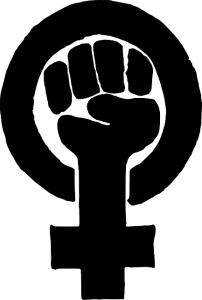Reading Black Feminism

Posted by Tristan
October 22, 2014
 Historically, the feminist movement has been centralized around white women. From the perspective of a privileged white person, I have been fed a very mainstream version of feminism. I have a lot of anxiety about talking about and publishing words about people of color as a white person, but I feel like it is important for other white feminists to self-educate on this topic because it is so important to try to understand that the intersections of oppression can alter peoples experiences of it.
Historically, the feminist movement has been centralized around white women. From the perspective of a privileged white person, I have been fed a very mainstream version of feminism. I have a lot of anxiety about talking about and publishing words about people of color as a white person, but I feel like it is important for other white feminists to self-educate on this topic because it is so important to try to understand that the intersections of oppression can alter peoples experiences of it.
I tried to compile a reading list that includes an overview of black feminist texts from courses I’ve taken at Oberlin, as well as including recommendations from friends who identify as black feminists:
- Ain’t I A Woman? Black Women & Feminism – bell hooks
- Arrested Justice: Black Women, Violence, and America’s Prison Nation – Beth E. Richie
- Assata: An Autobiography – Assata Shakur
- Blacks and Selected Poetry – Gwendolyn Brooks
- Black Feminist Thought: Knowledge, Consciousness, and the Politics of Empowerment – Patricia Hill Collins
- Black Sexual Politics: African Americans, Gender, and the New Racism – Patricia Hill Collins
- But Some Of Us Are Brave: All the Women Are White, All the Blacks Are Men: Black Women’s Studies – Gloria T. Hull, Patricia Bell Scott, and Barbara Smith
- “Combahee River Collective Statement” – The Combahee River Collective
- “Demarginalizing the Intersection of Race and Sex: A Black Feminist Critique of Antidiscrimination Doctrine, Feminist Theory, and Antiracist Politics” – Kimberlé Williams Crenshaw
- Feminist Theory: From Margin to Center – bell hooks
- Killing the Black Body: Race, Reproduction, and the Meaning of Liberty – Dorothy Roberts
- Kindred – Octavia Butler
- Sister Outsider – Audre Lorde
- Soldier – June Jordan
- Their Eyes Were Watching God – Zora Neale Hurston
- Women, Race, and Class – Angela Y. Davis
I have only included things that I am familiar with or my friends have recommended. If you have any suggestions for readings to add to this list, please comment below!
Leave a Reply
You must be logged in to post a comment.

